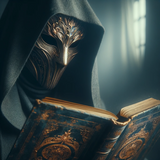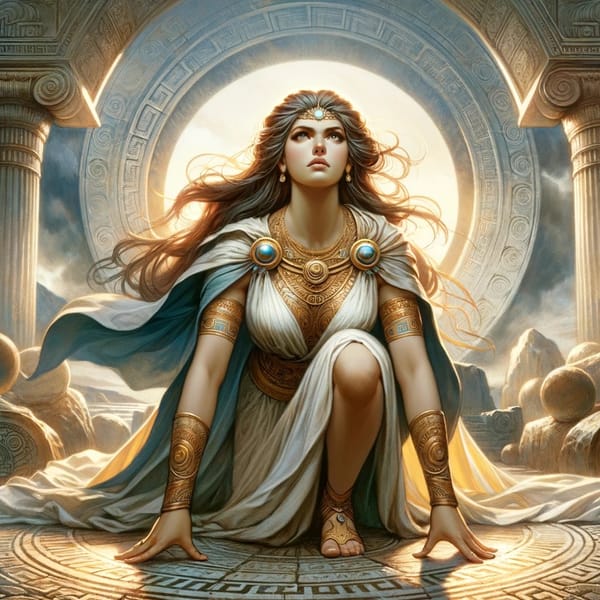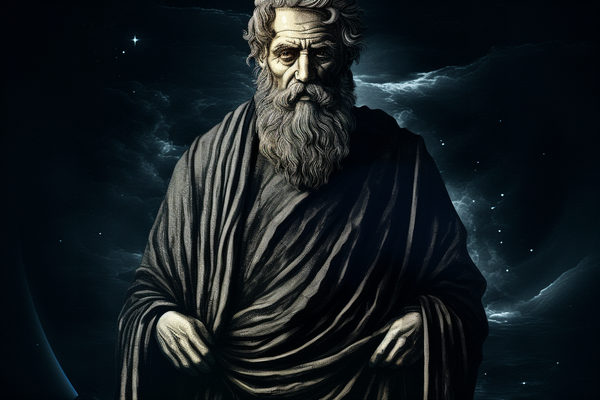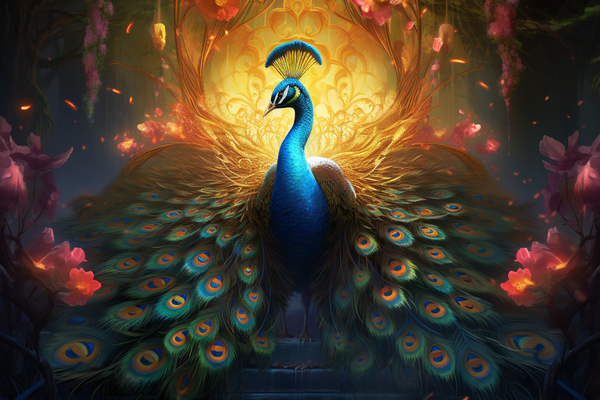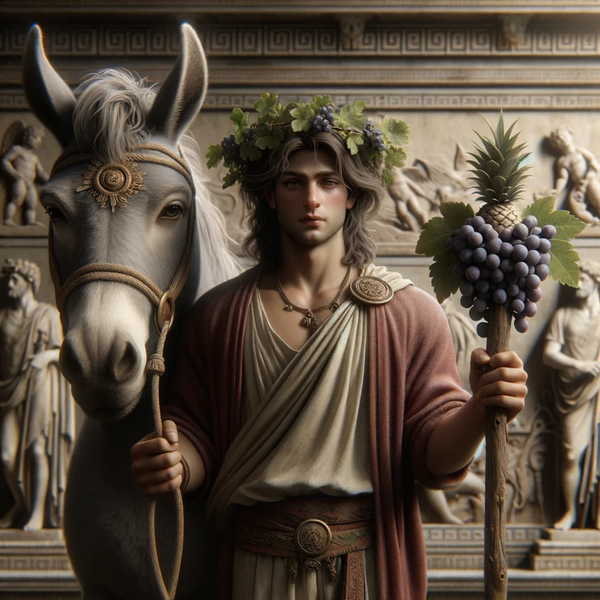IO: Moon Goddess, Princess... Cow?
Ever wonder why female cows have those cute crescent-shaped horns? No? Me either. But someone did! Io and her love affair with the King of the Heavens, is one of the oldest myths around.
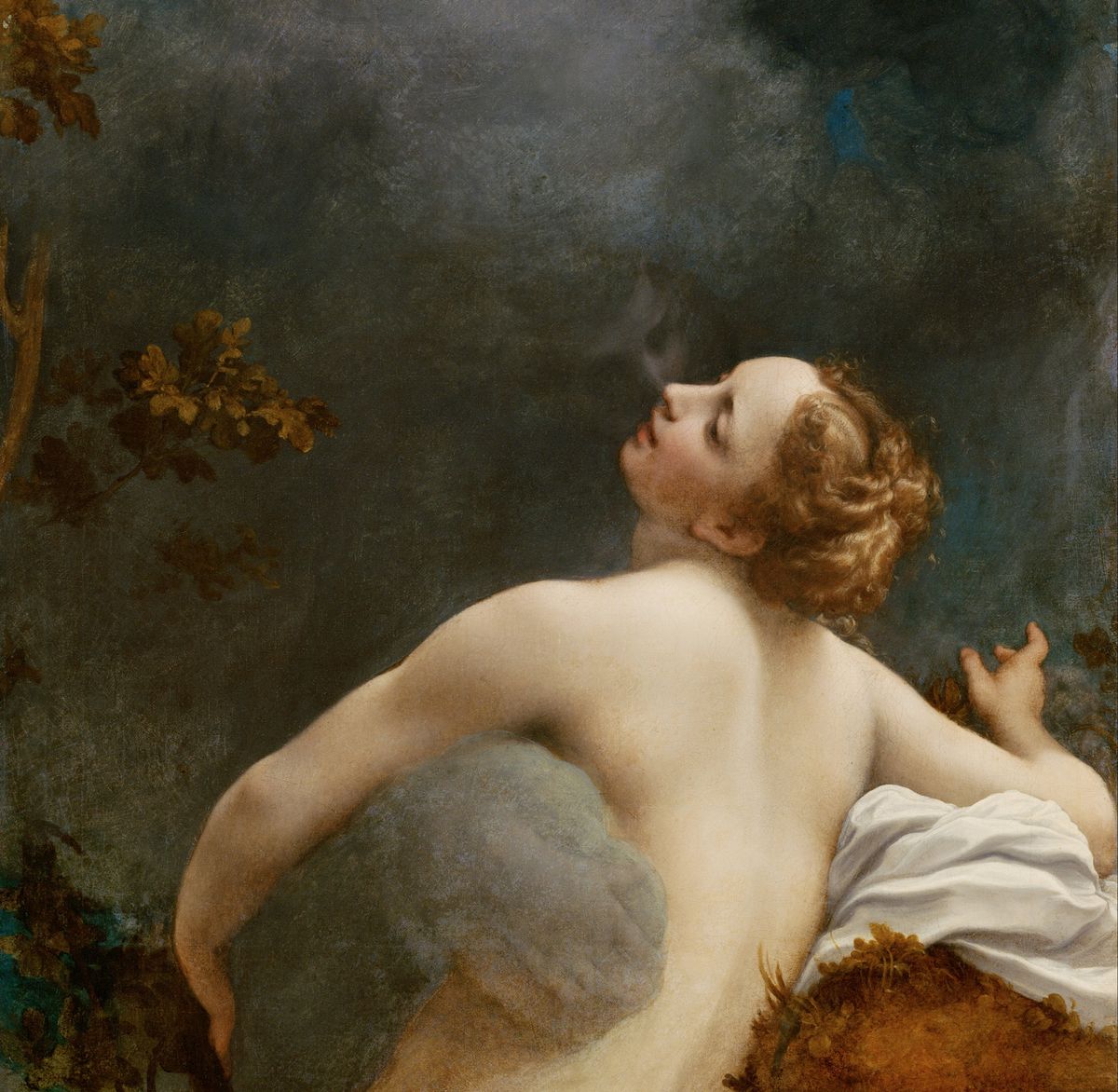
In honour of the new .io domain, it seems only fitting to kick things off with the bold and beautiful, Io.
Who is Io?
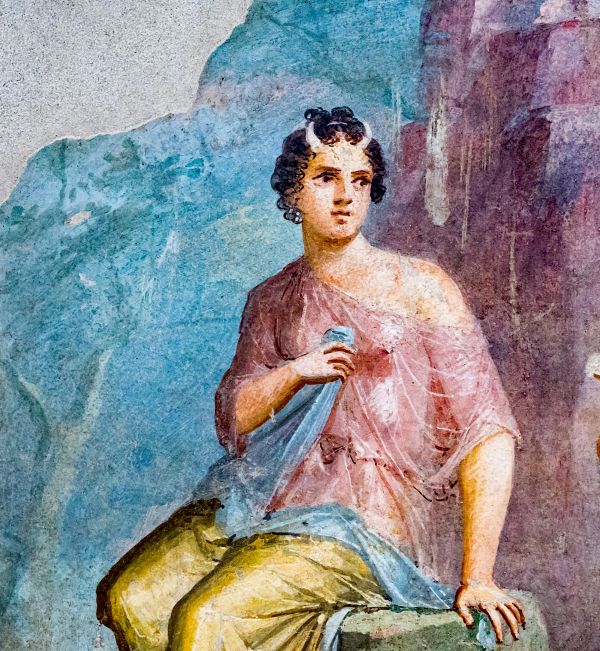
Io's parentage varies, by most accounts she is the daughter of the River god Inachus, who founded Argos. Her mother is sometimes said to be the water nymph Melia. Io is the granddaughter of the titans Oceanus and Tethys.
Her name means Moon.
And Zeus, king of the Heavens, fell in love with her.
The Affair
Imagine an affair so scandalous that it's talked about thousands of years after the event. The story of Io and her tryst with Zeus predates Hellenistic Greece, coming to them through their predecessors the Pelasgians.
This is a tale as old as time--Beauty becomes a beast.
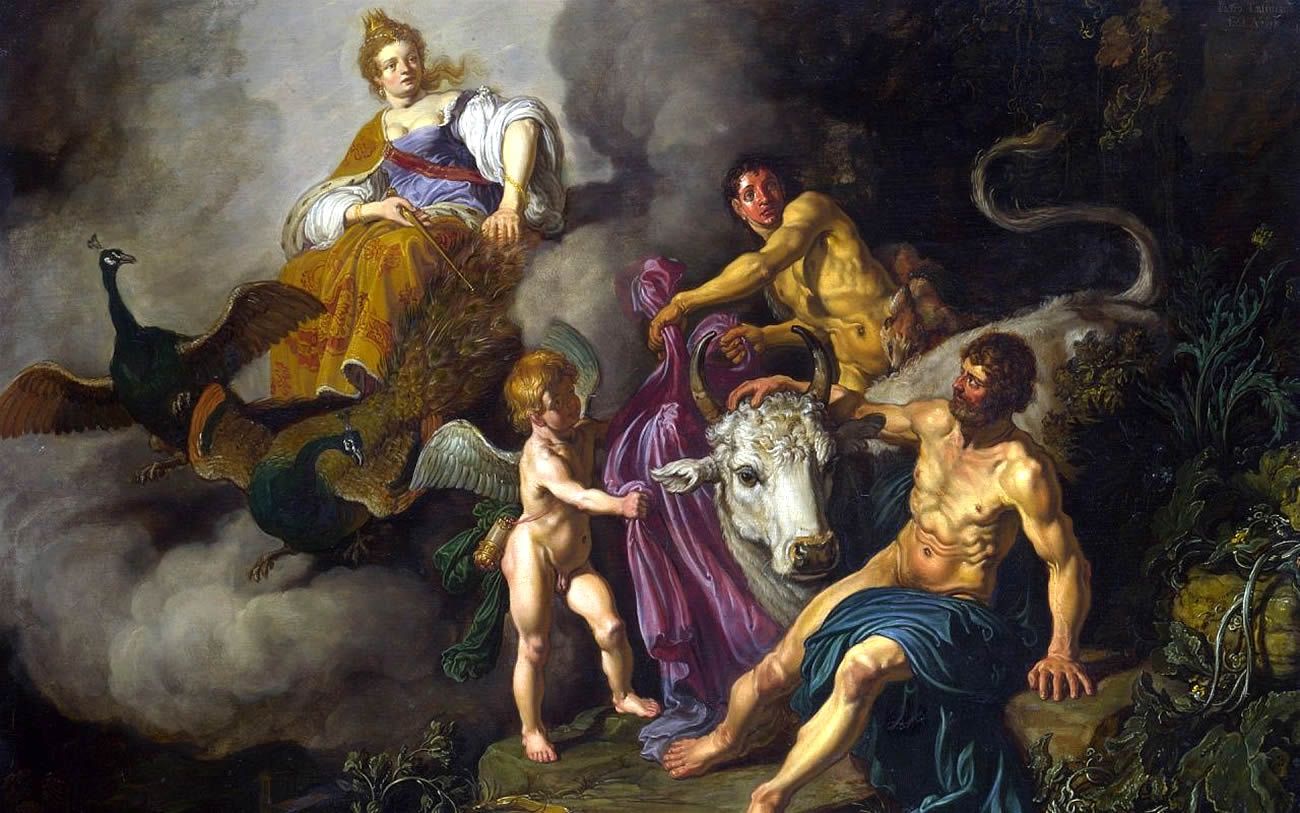
Here's the tea:
Io's Father was big time on team Hera. He picked her over Poseidon in a land dispute (a risk for a River God), had a temple built for her, and rumour has it, appointed his daughter Io as Hera's high priestess.
But while Io's father's attentions seemed to be lavished on the Queen of the Gods, Io's had drifted to the other half of Olympus's power couple, Hera's husband, Chief of the Gods, Zeus.
At first Zeus came to Io in her dreams, but eventually the pair met for real and an instant connection formed. In the version most popular among painters, Zeus seduces Io in the form of a cloud and the two began their love affair.
It was going as expected, until Hera came upon them during a tryst and then...
Now this is where versions vary.
Most popular is Zeus turns Io into a cow to conceal his affair from Hera.
"Oh hello, dear. Me? I was just admiring this cow I found."
An alternative version is Hera turns Io into a bovine as a punishment.
"Take that you...you cow!"
But my favourite is Io turns herself into a cow to hide. It just makes the most sense. She's the moon, the moon transforms. She also uses shapeshifting abilities on her own in another myth...but I digress.
Io is transformed into a cow. And Zeus acts like he was innocently hanging out with a farm animal... that he has zero attachment to and most definitely was not shagging. Hera isn't buying it, so she asks Zeus to gift her the cow.
Io shoot Z-man some, Don't you dare eyes.
And Zeus tells his wife, "Of Course, darling. What would I want with a silly ol' cow anyway?"
Hera has Io taken away to be kept with her herd, while Zeus mouths I'm sorry, love you, Babe. Call me?
And just when Io thought her day couldn't get any worse, she discovers that Hera's herd is guarded by a giant with a hundred eyes, named Argus the all seeing. Argus had this neat trick where he only does the I'm just resting my eyes thing with a few eyes at a time, so he is always awake and always watching.
Io cannot escape. Fortunately, Zeus sends his son and messenger Hermes to liberate her. Disguised as a shepherd, Hermes speaks some spells to put all of Argus' eyes asleep at once. Once the giant is down for the count, getting probably the first real sleep he's ever had, Hermes kills him with a rock.
Brutal.
To make matters worse, based on some genealogies, Argus was Io's nephew. So she's free but there's going to be a very difficult conversation when she gets home. At least there would be, but Hera isn't done with her yet.
The slighted wife sends a gadfly to torture Io. Still a cow, Io runs from the bug and ends up travelling all over the world. She meets Prometheus, who is at the time strapped to a rock having his liver eaten by a giant eagle. He gives her a pep-talk, and she decides enough is enough.
Io goes to the Nile, has a nice dip, and transforms back into herself. She gives birth to Zeus' son Epaphus, and Hera is all like, "I knew it!" and steals him. Finally, Zeus gets involved and is all, "Hera, give back the baby."
But Hera says, "Can't. Gave it away." Most likely followed by a sassy shrug.
Once again, Io wanders all over the world, until she finds Epaphus in Syria in the care of the Queen of Byblos. Mother and son return to Egypt, and from there, Io becomes associated with the goddess Isis, and Epaphus becomes the king of Egypt.
Through his children, he'd later become the ancestor of the "dark Libyans, and high-souled Aethiopians, and the Underground-folk and feeble Pygmies." (Sorry Pygmies, it's a quote from Hesoid, blame him not me.)
The Birth of Iphis
In Crete, not far from Cnossos, a man named Ligdus told his pregnant wife that due their financial situation, if she gave birth to a girl, he'd have to kill the baby. Ligdus' wife, Telethusa begged him to change his mind to no avail.
Words cannot describe the depths of Telethusa's turmoil, as she feared the child she carried would be slain and there would be nothing she could to do stop it. Then one night, in her dreams Io came to her. Now the goddess Isis, Io-Isis told the mother-to-be, "Hun, I got your back, just raise that child up no matter what it is and ignore your stupid husband." Or something to that effect.
When the time came for the baby to be born, Telethusa delivered a healthy baby girl. But to all the world, except for one nurse to whom she shared her situation, she had delivered a boy. Her husband, who clearly never bothered to change nappies, named the child Iphis, after his grandfather. A unisex name, much to Telethusa's relief.
Iphis lived as a boy, dressed as a boy, and when Iphis had reached the age of thirteen, Ligdus arranged for his 'son' to marry a fair-haired girl named Ianthe. Ianthe and Iphis were the same age, had studied together under the same teachers and were hopelessly in love.
But while Ianthe was excitedly looking forward to her wedding night with her crush. Iphis, knowing the marriage would expose her as female, felt hopeless because she madly and passionately loved Ianthe. She cried out to the gods of their cruelty. She begged them to turn her male. She reasoned, pleaded and tried to talk herself straight.
As the day of the wedding approached, Telethusa, sensing her child's misery, took her to the alter of Io-Isis and called out to the goddess, "You said you'd look out for us, I did as you said, please help!" No sooner had she finished then the alter began to shake. The moon-like horns of the statue shimmered with light and the rattling of unseen instruments filled the temple chamber.
Telethusa and Iphis decided that was pretty freaky, but hopefully a good sign. They left, but as Iphis follows, she began to change. Her legs grew longer, her arms stronger, and she began to feel different. Telethusa turned to look at her daughter and gasped, "Blimey, you're a boy!"
And sure enough, he was. Iphis and Ianthe were married and they lived happily ever after.
Natural Phenomenon
During annular solar eclipses, the new moon doesn't cover all of the sun, causing some of the sun to peak out along the edges. When it's a perfect ring, it's called a ring of fire, but when only the bottom shows, it's called "Devil's Horns", or "Solar Horns."
Could this natural phenomenon be the inspiration behind the Io and Zeus myth? If so, perhaps it'd be more fitting to refer to it as "Cow horns."


Sources:
Hesiod, The Aegimius Fragments - Greek Epic (8th - 7th Century BCE)
Aeschylus, Prometheus Bound - Greek Tragedy (5th Century BCE)
Aeschylus, Suppliant Women - Greek Tragedy (5th Century BCE)
Callimachus, Hymns - Greek Poetry (3rd Century BCE)
Callimachus, Fragments - Greek Poetry (3rd Century BCE)
Apollodorus, The Library - Greek Mythography (2nd Century CE)
Pausanias, Description of Greece - Greek Travelogue (2nd Century CE)
Hyginus, Fabulae - Latin Mythography (2nd Century CE)
Ovid, Metamorphoses - Latin Epic 1st B.C. (1st Century CE)
Ovid, Heroides - Latin Poetry 1st B.C. (1st Century CE)
Virgil, Aeneid - Latin Epic (1st Century CE)
Virgil, Georgics - Latin Bucolic (1st Century CE)
Propertius, Elegies - Latin Elegy (1st Century CE)
Valerius Flaccus, The Argonautica - Latin Epic (1st Century CE)
Statius, Thebaid - Latin Epic (1st Century CE)
Nonnus, Dionysiaca - Greek Epic (5th Century CE)
Suidas, The Suda - Byzantine Greek Lexicon (10th Century CE)

